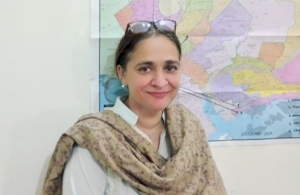A state-of-the-art laboratory conducting innovative research into tree pests and diseases has been officially opened today (Friday 13 May) by Defra and the Forestry Commission, as part of National Plant Health Week.
The £5.8 million Forest Research Holt Laboratory, located within the Alice Holt Forest in Surrey, will bring together leading scientists to undertake research on pests and pathogens which could be detrimental or seriously damaging to our forests. This will inform UK-wide efforts to combat ongoing pest and disease outbreaks, including from Oak processionary moth, Ips typographus and Phytophthora pluvialis, as well as emerging potential threats from abroad as a result of our warming climate, such as Emerald ash borer and Citrus longhorn beetle.
The launch of the Holt Laboratory and the Centre for Forest Protection represents a significant expansion of the UK’s capacity and capability to combat tree pests and diseases and manage emerging threats, including climate change. By assessing the pests and pathogens in a contained laboratory, scientists from Forest Research – Great Britain’s principal organisation for forestry and tree-related research – will be able to study them in a safe and controlled manner using cutting-edge technology and equipment.
New statistics released by Forest Research today show a record number of tree pests and diseases are being reported. The TreeAlert service received 3790 reports from the public over the past year (April 2021 –- March 2022) – a nearly 25% increase on the previous year. The most commonly reported pest and disease were Oak processionary moth and Ash dieback, respectively.
Minister for Biosecurity, Lord Benyon said:
This is a significant moment and important expansion of the UK’s capacity to overcome tree pests and diseases – and protect our forests.
Six months on from COP26 and Royal Assent of our Environment Act, it is fitting to be bringing forward cutting-edge research that will be central to keeping our trees healthy and resilient as we deliver on our ambitious commitment to treble tree planting rates by the end of this Parliament.
Chair of the Forestry Commission, Sir William Worsley said:
The threat to the health of our trees from pests and diseases is real and increasing. Trees are vital economic, environmental and social assets and so it is imperative that we do all we can to reduce these threats.
The opening of this new laboratory demonstrates the significant investment that the Government and the Forestry Commission are making to ensure the long-term resilience of our trees.
Forest Research Chief Executive, James Pendlebury said:
Pests and diseases pose an existential threat to our treescapes. The research conducted at the Holt Laboratory as part of the Centre for Forest Protection will be pivotal in our long-term ability to combat these threats and safeguard our treescapes for future generations.
This state-of-the-art facility builds on a long-term programme to protect our trees and forests from existing threats and ensures that we are at the forefront of defence against future risks.
Professor Richard Buggs, Royal Botanic Gardens, Kew, said:
Kew and Forest Research have been collaborating together on tree health issues for some time now, so it’s great to be coming together into a formal partnership for the Centre for Forest Protection.
Together, we can devise new ways to protect our trees and enhance their resilience. Ash dieback, acute oak decline, Dutch elm disease, here we come!
The Centre for Forest Protection, a new collaborative, virtual research network led jointly by Forest Research and Royal Botanic Gardens Kew also launches today with a mission to protect forests, woodlands and trees from environmental and socioeconomic threats now and in the future. This will involve innovative science, interdisciplinary research, expert advice, and training – supporting scientists across the UK and around the world. The broad remit of research and knowledge sharing will include investigations into understanding the genetic basis for resistance to high impact pests like ash dieback, which could inform future breeding programmes or reintroduction strategies for vulnerable species like ash and elm. Many of the forward-thinking research projects undertaken as part of the Centre for Forest Protection will be conducted at the Holt Laboratory. The successful launch of the Centre for Forest Protection delivers on a key commitment outlined in the England Trees Action Plan, which sets out the Government’s long-term plan for England’s trees, woodlands and forests.
Today’s announcement also comes ahead of the publication in summer this year of the new GB Plant Biosecurity Strategy, which will set out a biosecurity vision for the UK for the next five years. Building upon work achieved under the existing strategy published in 2014, the Strategy aims to deliver a step change in our plant health protections, actions and behaviours.
Public vigilance is a key part of the fight against tree disease. You can look out for any unusual symptoms – like leaf discolouration or ‘bleeding’ lesions – on trees and report any sightings via TreeAlert, the Forestry Commission’s online tree pest and disease reporting tool. The call to report diseases is being made as part of the third annual National Plant Health Week (9-15th May).

